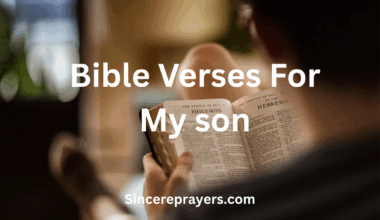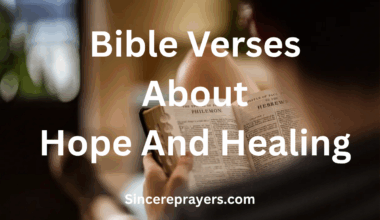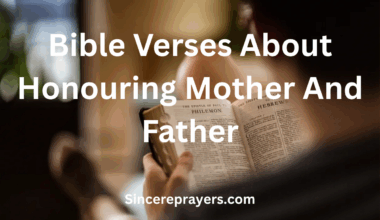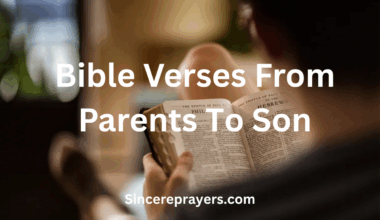One of the most difficult types of forgiveness to provide is typically forgiveness toward oneself. It may be easier for us to show grace to others, but it can be difficult to show the same grace to ourselves. Many people are unable to go on because they have not accepted God’s forgiveness for themselves and live with intense regret, humiliation, or guilt over previous transgressions. Scripture does, however, remind us that God’s kindness extends to all—to every sin, every failure, and every weakness.
We reject the effectiveness of Christ’s atonement when we cling to our guilt. Jesus died so that we may walk in freedom, not so that we could continue to live in shame. According to what the Bible verses about forgiving yourself says, we are fully cleansed when we confess our sins and ask God for forgiveness. The lingering condemnation comes from the lies of the enemy or from our own hearts, not from God. Restoration, tranquility, and spiritual rejuvenation are the results of genuine forgiveness, both from God and from ourselves.
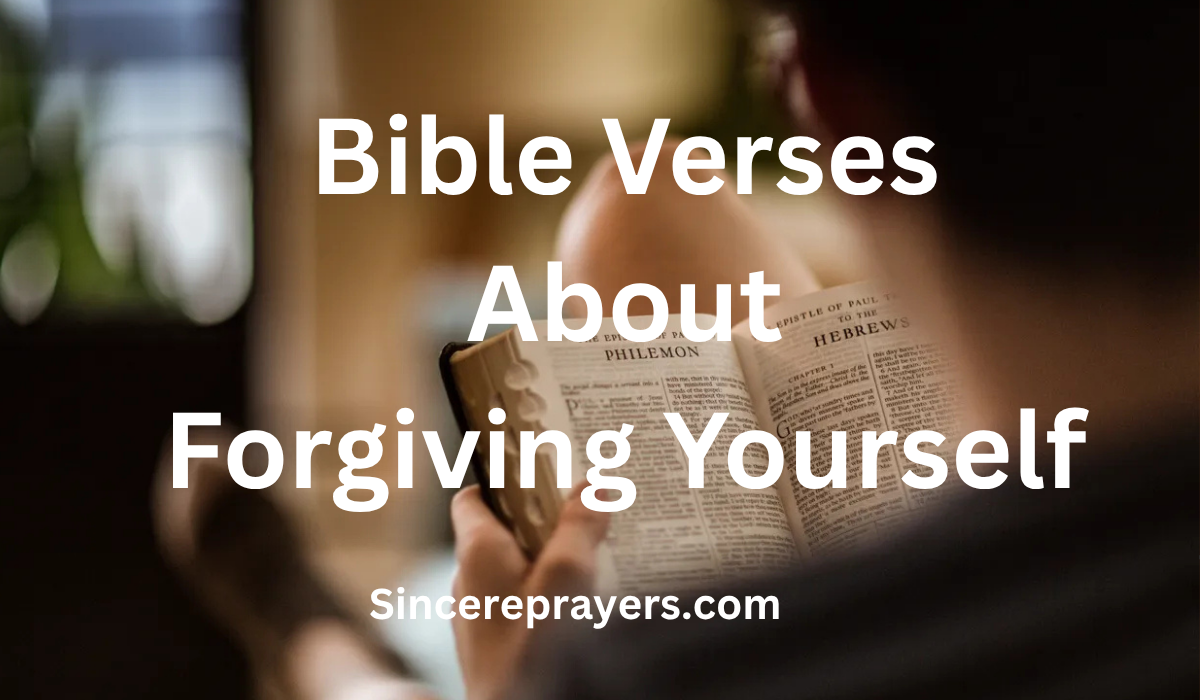
Seeing your past through the prism of God’s grace is what it means to forgive yourself, not to ignore it. You acknowledge that His love is greater than your mistakes when you accept His forgiveness. It’s a choice to proceed in faith, trusting that you have been transformed by His mercy. The Bible verses about forgiving yourself provides us with comfort and reassurance that our sins are forgiven and that we may begin anew.
We’ll look at 35 potent Bible passages about self-forgiveness in this essay. Every verse provides insight, consolation, and reality to aid in letting go of guilt and accepting God’s unfailing grace. Let these verses serve as a reminder that God’s forgiveness defines you, not your past. His Word gives you the strength to live freely as His redeemed child, walk in peace, and forgive yourself.
35 Inspiring Bible Verses About Forgiving Yourself in 2025
1. Isaiah 1:18
“Though your sins are like scarlet, they shall be as white as snow; though they are red as crimson, they shall be like wool.”
God invites us to reason with Him and see that His forgiveness is total and cleansing. When He forgives, He doesn’t leave stains behind. This verse reassures us that through repentance and faith, our sins are completely washed away. No matter how deep the guilt, God’s grace can make us pure again. It’s a call to release self-condemnation and accept the transforming mercy of God.
2. Psalm 103:12
“As far as the east is from the west, so far has he removed our transgressions from us.”
This verse paints a beautiful picture of how completely God removes our sins. Once forgiven, they are gone beyond recovery or remembrance. When you struggle to forgive yourself, remember that God no longer holds your sins against you. He separates them from your identity. This truth invites you to align your heart with His perspective—if God has forgotten your past, you can let go of it too.
3. 1 John 1:9
“If we confess our sins, he is faithful and just and will forgive us our sins and purify us from all unrighteousness.”
Confession leads to cleansing. God’s promise in this verse is absolute—when we come to Him in repentance, He forgives and purifies completely. Forgiving yourself begins with believing that this promise applies to you. There’s no sin too great for His mercy. As you receive His forgiveness, allow that truth to silence your inner guilt and replace it with peace and gratitude.
4. Romans 8:1
“Therefore, there is now no condemnation for those who are in Christ Jesus.”
In Christ, condemnation has no authority. This verse is a declaration of freedom for every believer burdened by guilt. When you’ve surrendered your sins to Jesus, you are no longer defined by your mistakes. God sees you through the righteousness of His Son. Holding onto guilt contradicts this truth. Let this verse free you to forgive yourself, knowing you stand blameless before God’s eyes.
5. Micah 7:19
“You will again have compassion on us; you will tread our sins underfoot and hurl all our iniquities into the depths of the sea.”
God’s forgiveness is not partial—it’s absolute. This verse illustrates His complete victory over sin and guilt. When God casts your sins into the sea, they’re gone forever. You don’t need to dive in to retrieve them. Let go of self-blame and embrace the mercy that buries your past. God’s compassion ensures your story isn’t defined by failure but by redemption.
6. Ephesians 1:7
“In him we have redemption through his blood, the forgiveness of sins, in accordance with the riches of God’s grace.”
Our forgiveness is rooted in Christ’s sacrifice, not in our performance. Through His blood, we are completely redeemed. When guilt lingers, remember that forgiveness isn’t earned—it’s received. God’s grace is abundant, overflowing with mercy that covers every failure. Accepting this truth allows you to forgive yourself and walk in the freedom of redemption that Jesus purchased for you on the cross.
7. 2 Corinthians 5:17
“Therefore, if anyone is in Christ, the new creation has come: The old has gone, the new is here!”
God’s forgiveness doesn’t just erase the past—it transforms your identity. When you are in Christ, your old life no longer defines you. The shame, mistakes, and regrets lose their power. You’ve been made new by His Spirit. Forgiving yourself means embracing this new beginning and believing that God has rewritten your story in grace and renewal.
8. Philippians 3:13-14
“Forgetting what is behind and straining toward what is ahead, I press on toward the goal to win the prize for which God has called me.”
Paul teaches us that growth requires letting go of the past. Dwelling on past sins or failures hinders spiritual progress. God wants you to move forward with purpose, not live in regret. Forgiving yourself is part of pressing on toward God’s call—embracing the present and the future He has planned for you in Christ Jesus.
9. Colossians 3:13
“Bear with each other and forgive one another… Forgive as the Lord forgave you.”
This verse calls us to mirror God’s forgiveness—not just toward others, but also toward ourselves. If God forgave you fully, you can extend that same grace inward. His standard for forgiveness has no limits. Learning to forgive yourself is an act of obedience, trusting that His mercy is greater than your self-condemnation.
10. Psalm 51:10
“Create in me a pure heart, O God, and renew a steadfast spirit within me.”
David’s prayer after sinning reminds us that renewal begins in the heart. Forgiving yourself starts with allowing God to cleanse your spirit. When you ask Him to purify your heart, He restores peace where guilt once lived. This verse invites you to surrender shame and receive God’s renewal—a clean slate born from divine mercy.
11. Hebrews 8:12
“For I will forgive their wickedness and will remember their sins no more.”
God’s forgiveness is complete—He chooses not to remember your sins. If He has forgotten them, why should you keep holding on? This verse reassures you that God doesn’t dwell on your past. Once forgiven, your slate is clean. Let this truth set you free to forgive yourself and live in the peace that comes from divine amnesia.
12. Isaiah 43:25
“I, even I, am he who blots out your transgressions, for my own sake, and remembers your sins no more.”
God doesn’t just forgive for your sake, but for His own—because forgiveness reflects His nature. He blots out your sins completely. When guilt resurfaces, remind yourself that the record has been erased. Forgiving yourself means agreeing with God’s decision to forget and to move forward in His love and acceptance.
13. John 8:36
“So if the Son sets you free, you will be free indeed.”
Christ’s freedom isn’t partial—it’s total. When He sets you free from sin, you are no longer bound by guilt or shame. Self-forgiveness begins by accepting that freedom as truth. Don’t chain yourself to what Christ already broke off. You are free indeed—walk boldly in that liberty, confident that your forgiveness is secure in Him.
14. Psalm 32:5
“Then I acknowledged my sin to you… and you forgave the guilt of my sin.”
David’s confession led to immediate relief and forgiveness. Hiding guilt only prolongs pain, but confession brings healing. Once God forgives, the guilt loses its grip. This verse is a reminder that your honesty before God opens the door to peace. After He forgives you, choose to forgive yourself and rest in His mercy.
15. Romans 5:8
“But God demonstrates his own love for us in this: While we were still sinners, Christ died for us.”
Forgiveness isn’t about being deserving—it’s about God’s love. Christ died for you at your worst, proving that His love surpasses your failures. When you can’t forgive yourself, remember that Jesus saw your sins and chose the cross anyway. His sacrifice covers every regret. Embracing that truth allows your heart to finally rest in grace.
16. Luke 23:34
“Jesus said, ‘Father, forgive them, for they do not know what they are doing.’”
Even in agony, Jesus extended forgiveness to those who wronged Him. His example teaches us the depth of divine compassion. Sometimes, we must forgive ourselves for actions taken in ignorance or weakness. If Christ could forgive His persecutors, surely He empowers you to forgive yourself and walk in the same mercy He displayed.
17. Matthew 6:14-15
“For if you forgive other people when they sin against you, your heavenly Father will also forgive you.”
Forgiveness is both vertical and horizontal—it flows from God to you and from you to others, including yourself. If God extends forgiveness freely, you must too. Refusing to forgive yourself contradicts the mercy you’ve already received. Let His forgiveness shape your heart to release self-condemnation and embrace His compassion.
18. James 5:16
“Therefore confess your sins to each other and pray for each other so that you may be healed.”
Confession brings healing—not only spiritually but emotionally. When you share your struggles and seek prayer, God begins restoring peace. Forgiving yourself often happens in community, as others remind you of God’s grace. Healing flows where honesty dwells, allowing guilt to be replaced by freedom and faith in His forgiveness.
19. Psalm 34:18
“The Lord is close to the brokenhearted and saves those who are crushed in spirit.”
When guilt breaks your heart, God draws near. His compassion reaches into your pain and restores hope. This verse reminds you that you are never alone in regret. Forgiving yourself starts by allowing God’s presence to comfort and heal your wounded spirit. His closeness assures you that redemption is always possible.
20. Lamentations 3:22-23
“Because of the Lord’s great love we are not consumed… his compassions never fail. They are new every morning.”
Each new day brings fresh mercy. God’s compassion renews continually, reminding you that yesterday’s mistakes don’t define today. You are sustained by His love, not your perfection. Let His daily mercy free you to forgive yourself, rise again, and live in the confidence of His unending grace.
21. 1 Peter 2:24
“He himself bore our sins in his body on the cross, so that we might die to sins and live for righteousness; by his wounds you have been healed.”
This verse reminds us that Jesus carried our sins so we could live in freedom. His wounds bring both spiritual and emotional healing. If He bore your sins, there’s no need to keep carrying the weight of guilt. Forgiving yourself honors the sacrifice He made and allows you to live in the righteousness He purchased for you.
22. Matthew 11:28-29
“Come to me, all you who are weary and burdened, and I will give you rest.”
Jesus invites the weary to find rest in Him. Guilt and regret are heavy burdens that He never intended for you to bear. Forgiving yourself means surrendering those weights to Christ. When you come to Him, He replaces your inner turmoil with peace. His rest renews your spirit and reminds you that grace is stronger than shame.
23. 1 John 3:20
“If our hearts condemn us, we know that God is greater than our hearts, and he knows everything.”
Sometimes our conscience refuses to let go, even after we’ve been forgiven. This verse reassures us that God’s grace surpasses our self-condemnation. When your heart accuses you, remember that God’s judgment is final—and it declares you forgiven. Trust His greater love and let it silence the voice of guilt within you.
24. Psalm 86:5
“You, Lord, are forgiving and good, abounding in love to all who call to you.”
God’s nature is rooted in forgiveness and abundant love. When you seek Him, He doesn’t respond with punishment but with mercy. This verse reminds you that His forgiveness is always available. If God is so gracious, you can reflect that grace by forgiving yourself. His goodness transforms guilt into gratitude.
25. Hebrews 10:17
“Their sins and lawless acts I will remember no more.”
God’s forgiveness is not partial—He forgets your sins entirely. This divine forgetfulness demonstrates the depth of His mercy. If God has chosen not to remember your mistakes, holding onto them yourself is unnecessary. Let His promise erase your guilt and inspire you to embrace the peace of total forgiveness.
26. Zephaniah 3:17
“The Lord your God is with you… He will take great delight in you; in his love he will no longer rebuke you, but will rejoice over you with singing.”
God doesn’t just forgive you—He rejoices over you. His love restores your worth and replaces rebuke with celebration. When you forgive yourself, you align with His joy. You are no longer condemned but cherished. Let His delight wash away your shame and fill your heart with confidence in His love.
27. Proverbs 28:13
“Whoever conceals their sins does not prosper, but the one who confesses and renounces them finds mercy.”
True freedom begins with honesty. Concealed guilt breeds pain, but confession opens the door to mercy. Once you’ve confessed and repented, you have found God’s forgiveness. Continuing to condemn yourself after that is unnecessary. This verse invites you to accept His mercy fully and forgive yourself as part of your healing process.
28. Titus 3:5
“He saved us, not because of righteous things we had done, but because of his mercy.”
You are forgiven, not because you’ve earned it, but because of God’s mercy. This verse humbles and frees us—it’s not about being perfect but about receiving grace. When you struggle to forgive yourself, remember that salvation and forgiveness rest solely on His compassion, not your record. Accept His mercy and live free.
29. Nehemiah 9:17
“But you are a forgiving God, gracious and compassionate, slow to anger and abounding in love.”
God’s patience and compassion define His character. He doesn’t hold grudges or dwell on your failures. His love is steadfast and forgiving. This verse assures you that His mercy outlasts your mistakes. Learning to forgive yourself means mirroring His nature—letting grace override guilt and walking confidently in His unfailing love.
30. 2 Samuel 12:13
“Then David said to Nathan, ‘I have sinned against the Lord.’ Nathan replied, ‘The Lord has taken away your sin. You are not going to die.’”
David’s repentance was met with immediate forgiveness. God didn’t prolong punishment—He restored David instantly. Likewise, your sincere repentance removes the barrier of guilt. Forgiving yourself means believing God’s word when He says you are forgiven. Like David, you can rise again, knowing grace has covered your past.
31. 2 Chronicles 7:14
“If my people, who are called by my name, will humble themselves and pray… then I will forgive their sin and heal their land.”
This promise extends beyond nations—it reaches hearts. God responds to humility and repentance with forgiveness and healing. When you forgive yourself, you’re participating in that healing. The same God who restores nations can restore your soul. His forgiveness renews everything broken inside you.
32. Psalm 130:3-4
“If you, Lord, kept a record of sins, Lord, who could stand? But with you there is forgiveness.”
If God recorded every sin without grace, no one could survive His judgment. Thankfully, His mercy erases the record. This verse reminds you that forgiveness is His nature. Since He doesn’t keep score, you don’t need to either. Forgiving yourself is an act of faith—trusting that His mercy has made you whole.
33. Mark 11:25
“And when you stand praying, if you hold anything against anyone, forgive them, so that your Father in heaven may forgive you your sins.”
This verse calls us to release bitterness—toward others and ourselves. Holding grudges, even against yourself, hinders prayer and peace. When you forgive yourself, you create room for God’s love to flow freely in your life. His forgiveness inspires you to extend grace in every direction, including inwardly.
34. Romans 3:23-24
“For all have sinned and fall short of the glory of God, and all are justified freely by his grace.”
Everyone has failed—no one is beyond grace. This verse equalizes us before God, reminding us that justification is a gift. You are not defined by your shortcomings but by His righteousness. Forgiving yourself becomes easier when you realize everyone depends on the same mercy that redeems you.
35. Galatians 5:1
“It is for freedom that Christ has set us free. Stand firm, then, and do not let yourselves be burdened again by a yoke of slavery.”
Christ died to make you free—not bound by guilt or regret. Self-forgiveness is part of standing firm in that freedom. Don’t allow the weight of past sins to enslave you again. Walk confidently in the liberty Christ purchased, knowing that forgiveness is not temporary—it’s eternal and complete.
Conclusion
One of the most freeing acts of faith you can do is to forgive yourself. The Bible makes it quite evident that God is fully forgiving. He does not define you by your shortcomings or hold your history against you. His grace offers you a new beginning, and His kindness covers every error. It would be like carrying chains that He has already broken if you continued to harbor guilt after being forgiven. Believing what God has already said—that you are loved, forgiven, and free—is the first step toward truly forgiving yourself.
God’s heart toward His children is revealed in each of these scriptures. Mercy, not punishment, is what he enjoys. You acknowledge His truth that your sins are forgiven and forgotten when you accept His grace. Forgiving oneself entails letting go of the influence that the incident had on you, not forgetting it. It’s a choice to live in accordance with God’s Word, putting healing above self-loathing.
Therefore, let go of the guilt that has been a burden for you today. You are who God says you are—redeemed, renewed, and restored—not who you were. Let your tale be rewritten by His love. You can freely receive God’s grace when you forgive yourself, which will calm your heart and offer you hope for the future. Keep in mind that you have the right to live fully in the freedom that Christ bought. Be brave and forgiving of others, of yourself, and of the lovely life that God has already planned for you.
